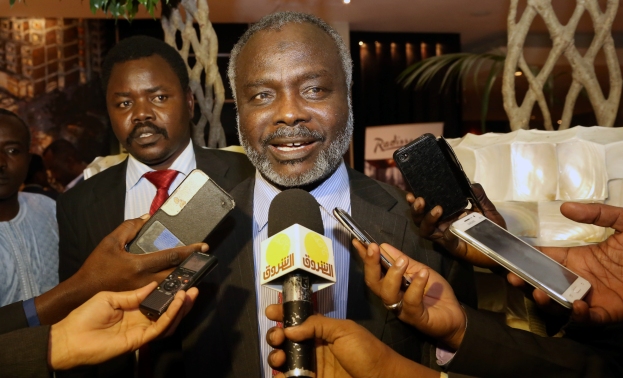JEM calls on African mediation to consult Sudanese opposition

February 14, 2017 (KHARTOUM) – The leader of the Justice and Equality Movement (JEM) Djibril Ibrahim Tuesday has called on the African Union High Level Implementation Panel (AUHIP) to consult the Sudanese opposition groups before to convene any meeting, pointing it would help to hold successful peace discussions.
The opposition Sudan Call alliance which includes political and armed groups met last January in Paris where it called on the government to commit itself to the African Union Roadmap Agreement and reiterated its rejection for the outcome of the government-led dialogue conference.
In Khartoum, Sudanese Presidential Assistant Ibrahim Mahmoud Hamid Tuesday received the AU Representative in Khartoum Mahmoud Khan. The presidency said the African diplomat passed on a verbal message from the AUHIP head and chief mediator Thabo Mbeki who is expected to visit Khartoum soon.
Speaking to Sudan Tribune, JEM leader said they are committed to negotiate a peaceful solution paving the way towards democratic reforms and stability in Sudan. He further said that separate consultations with the parties to the conflict would allow good preparations, to indentify the positions and contribute to the success of any future talks.
“The Mediation chose to reach Khartoum first, and to listen to its latest positions before to meets us. They are entitled to meet them and we have no objection that they go to Khartoum once or twice, but they have to sit down with the other parties,” he said.
“The mediation has to convene a meeting with the Sudan Call before any future round or a joint meeting,” he stressed.
Last December the chief mediator Mbeki was in Khartoum for consultations with the Sudanese officials.
Following a meeting with President Omer al-Bashir, he said the latter assured him that the opposition groups can take part in the implementation of the National Document endorsed last October by the national dialogue conference in Khartoum.
Asked if they have received any new proposal from the mediation, Ibrahim disclosed that an AUHIP official met them in Paris during the Sudan Call meeting and promoted some new ideas bypassing the Roadmap Agreement and the preparatory meeting and endorsing the government-led national dialogue.
“We didn’t get the full details of the proposal but we rejected it and stuck to the road map,”. he said stressing “We reject any approach calling to bypass the roadmap or to accept the status quo and to deal with the government led-dialogue”.
“This will have devastating consequences,” he emphasized.
During the last round of talks in August 2016, the government and the armed groups failed to sign a humanitarian cessation of hostilities. Following what, Khartoum decided to move forward without the opposition groups and convened a national dialogue conference.
The government argues that the content of the National Document includes all the opposition’s demands for a just peace and democratic rule. But the opposition brushes aside these claims, saying the government has to accept the inclusive dialogue and restore freedoms before if it is ready to compromise with them.
KEEN TO A NEGOTIATED SOLUTION
Ibrahim said they are keen to achieve peace in Sudan and to end definitively the armed conflicts in Darfur or the Two Areas, insisting that war is devastating and affect mainly civilians who are the first victims.
He alluded to their capability to resume attacks in Darfur if needed and called on the government to listen to the voice of reason and to having the needed political will to achieve peace.
“If we found a real partner who wants peace, and have the will to achieve it, it will be easier and better for everyone,” added the rebel leader.
He said the regime has to have in mind that there is no military solution to the conflict and they have to embrace peace.
“Our Movement is capable of fighting and disturbing the regime, but this will lead to more Sudanese bloodshed,” he said.
Regarding the role of the international community in the ongoing efforts to reach peace in Sudan, Ibrahim said the absence of U.S. envoy following the American elections has created a vacuum. Also, he hailed the appointment of special envoys for Sudan by Berlin and Paris, adding it would contribute to facilitate the peace process.
Further he expected that the leader of the opposition National Umma Party (NUP) would continue from inside the Sudan to promote for the idea of inclusive dialogue and to defend the Roadmap Agreement.
Also, he said any negotiations should lead to simultaneous signing of cessations of hostilities in the Two Areas and Darfur, pointing they are coordinating with the SPLM-N on this respect.
(ST)
